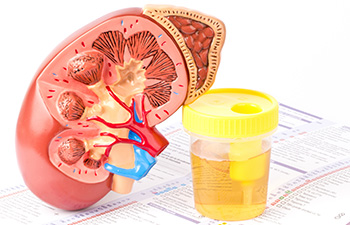Kidney Disease and Obesity: What’s the Connection?

Diabetes and high blood pressure are closely linked to obesity, and are leading causes of kidney disease and kidney failure.
Your kidneys are two bean-shaped organs located just below your rib cage. Their primary function is to clean your blood and produce urine by removing water-soluble wastes like urea and ammonium. When the kidneys don’t work properly (or at all), excess waste products build up in your bloodstream, which can lead to a host of problems.
Diagnosing Kidney Disease: The Symptoms

Kidney disease is often diagnosed via urinalysis. Although the initial stages of the disease can be asymptomatic, early symptoms may include:
- Nausea
- Vomiting
- Loss of appetite
- Fatigue
- Sleep issues
- Changes in urine output
When untreated, down-the-road complications of kidney disease may include:
- High blood pressure (Note: High blood pressure can cause kidney disease, but kidney disease can also cause high blood pressure. In medicine, this is known as a bi-directional relationship.)
- Anemia or iron-deficient blood
- Bone disease
- Nerve damage
Kidney Disease Prevention and Treatment: Your Action Plan
There is a lot you can do to prevent kidney disease and/or slow its progression.
Weight Loss
Following a healthy diet and engaging in regular physical activity is a great place to start your weight loss efforts. Not all weight loss plans are appropriate for people with existing kidney disease. For example, popular low-carb, protein-heavy diets like Atkins can harm the kidneys. Too much protein taxes the already strained kidneys, and when your body enters a fat burning stage (ketosis), your kidneys are also at risk. Low-carb diets aim to achieve ketosis or the ultimate fat-burning state. Run any diet plan by your doctor if you have kidney disease to make sure it is appropriate for your situation.
Weight-loss surgery can also play a role. Studies have shown that it can yield improvements in blood sugar and blood pressure. Some people are able to stop taking all of their medications once they have achieved substantial weight loss after surgery.
“Preliminary results suggest such surgery can improve the levels of albumin in the urine for patients with chronic kidney disease [CKD],” according to the Obesity Action Coalition. “Research is ongoing to assess the effects of this treatment in patients with CKD.”
There is another potential benefit: Weight-loss surgery increases an obese individual’s chances of qualifying for a kidney transplant. When the kidneys fail, a kidney transplant is a viable and life-saving option; but only if you qualify.
Salt Reduction
Too much salt increases blood pressure, which can cause kidney disease. The Institute of Medicine recommends that people aged 14 to 50 restrict their sodium intake to 2,300 milligrams (mg) daily. High-risk groups such as older individuals, African Americans and people with hypertension, diabetes, or chronic kidney disease should not consume more than 1,500 mg of sodium per day. We often associate salt with the ubiquitous salt shaker, but processed foods are also loaded with salt. Check labels and choose foods that are labeled “sodium-free” or “very low sodium.”
Check In with Your Doctor
Make sure you are screened for kidney disease if you are at risk. This may include an annual estimated glomerular filtration rate (eGFR), to measure your kidney function; and a urinary albumin-creatinine ratio test, to see if your kidneys are working properly.


